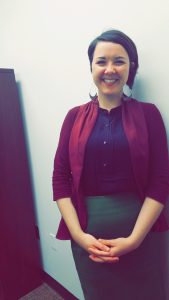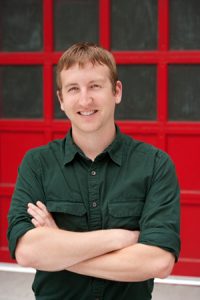We love to showcase the successes and accomplishments of our esteemed alumni so that current and prospective students can see real life answers to the age old question, “So, what does one do with a degree in Gender and Women’s Studies?”
Click on our alums below and read more about the amazing things they’re doing.
Charrise Alexander, ’06
 Charrise Alexander currently works as a lawyer, litigating in DC as an associate at Pillsbury Winthrop Shaw Pittman LLP, but long before attaining this position, Alexander was a student in GWST at UMBC and involved in the WILL Program. Alexander recalls, “One of my favorite experiences was in my first few weeks at UMBC – sitting in a meeting room filled with women that would become the first members of WILL.” WILL is now a long-established program at UMBC, through the hard work of Alexander and her peers. “I remember learning advocacy, civil disobedience, and learning real sisterhood. I am still friends with many of those women that were in that room.”
Charrise Alexander currently works as a lawyer, litigating in DC as an associate at Pillsbury Winthrop Shaw Pittman LLP, but long before attaining this position, Alexander was a student in GWST at UMBC and involved in the WILL Program. Alexander recalls, “One of my favorite experiences was in my first few weeks at UMBC – sitting in a meeting room filled with women that would become the first members of WILL.” WILL is now a long-established program at UMBC, through the hard work of Alexander and her peers. “I remember learning advocacy, civil disobedience, and learning real sisterhood. I am still friends with many of those women that were in that room.”
Her first job after graduation was for a large commercial real estate trust. It might not seem immediately clear how GWST coursework would be relevant, but for Alexander, it was. “Because I leaned about community organizing in the GWST program, I was able to run the company’s first ever tenant rent relief program when the market crashed. I met one-on-one with tenants. I helped them organize into business improvement committees to better address their needs. In turn, I took their concerns to the president of the company to see how we could retain those tenants and get them what they need.” Concepts learned in classes and practical organizing skills learned in WILL helped prepare her to make a real difference in that first job.
In law school, Alexander continued to see her work shaped by GWST. “I wrote journal articles about black women’s natural hair as protected form of expression under the First Amendment and why Congress needed to pass the Employment Non-Discrimination Act, as a critical step in protecting womyn and our trans and non-binary family,” she remembers. Alexander continues: “In my current position, I helped found the firms first Employee Resources Group, focused on LGBT+ employees and staff, and I have taught webinars about diversity in the workplace.” Alexander’s work continues to echo beyond the organizing rooms at UMBC and into the wider community.
When asked why students should consider a major or minor in GWST, Alexander was clear: “Frankly, the coursework is relevant and critical. It not only helps you in any career field, but it also helps you grow as a person.” Regardless of career plans, GWST teaches the critical thinking, writing, and doing skills necessary to make a real difference. “The courses I took in the GWST program, and the relationships I formed with other members of WILL, helped me breakdown in to tiny pieces all of the ways I viewed the world, and myself, and allowed me to examine each one,” Alexander says. “I graduated with the confidence, and the ability, to think critically about myself in the structures of society. I gained the knowledge, resources, and network to continue to be an agitator for change and an ally for others.” And we are so glad she did!
Michelle Barrow, ’08
Michelle Barrow was one of the first UMBC students to get a Gender and Women’s Studies degree. Michelle started off her college career as a Sociology major, before the Gender and Women’s Studies program was created. Michelle said that the GWST program allowed her to become open to many different ideas and learn how to advocate for herself.
After leaving UMBC, she worked at many different non-profit organizations, trying to use her degree to create a positive impact on others’ lives. Soon enough, she realized that it was not an area she would work in forever. With time, Michelle found that working in marketing was something that she enjoyed doing for a living. For a period in time, Michelle worked doing freelance marketing. With a chance of luck, Michelle has now made a full circle and is once again at UMBC, but this time not as a student, but working for UMBC doing marketing for the Division of Professional Studies.
When we sat down with Michelle, she stated that her Gender and Women’s Studies degree gave her self-reflective skills, the ability to be able to be critical of herself and use it to continue growing. Michelle said that she believed that it is important to try many different things and not limit yourself to one thing in life. She believes that everyone should take GWST classes because it gives them the skills to think critically and defend their ideas in both professional and personal settings.
Caitlyn Leiter-Mason, ’14
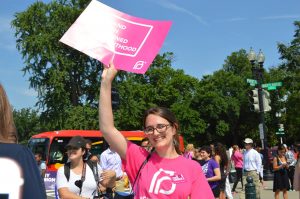 Caitlyn Leiter-Mason graduated from UMBC in Spring 2014 with a double major in Political Science and Gender and Women’s Studies. While at UMBC, Caitlyn was active in SGA, UMBC College Democrats, and was the first student liaison for WILL’s Elect Her program. GWST caught up with Caitlyn in July 2017 in the last weeks of her job at Planned Parenthood, just before she headed off to Rutgers to pursue a Master’s in Public Policy.
Caitlyn Leiter-Mason graduated from UMBC in Spring 2014 with a double major in Political Science and Gender and Women’s Studies. While at UMBC, Caitlyn was active in SGA, UMBC College Democrats, and was the first student liaison for WILL’s Elect Her program. GWST caught up with Caitlyn in July 2017 in the last weeks of her job at Planned Parenthood, just before she headed off to Rutgers to pursue a Master’s in Public Policy.
Caitlyn’s interests naturally drew her to Annapolis to work in legislative affairs before taking the position of Development and Supporter Engagement Coordinator at Planned Parenthood of Maryland. Asked how her work in Gender and Women’s Studies prepared her for these positions Caitlyn says, “In GWST I learned to think critically and got the awareness that things are differently important to different groups of people.” Her work at Planned Parenthood means she works with individual and corporate donors as well as clients, all of whom have different concerns and relationships to questions of reproductive justice. As she says, “I am able to reconcile the different perspectives I have to have to understand the many reasons it is important to keep health centers open every day.”
Caitlyn credits a summer course on gender and health policy with helping her learn some of the nitty gritty skills she needs day to day at Planned Parenthood and teaching her that “health means different things to different people.” This and other GWST course work reminded her over and over how important it is to think about lived experience first when making decisions about health policy.
Caitlyn also remembers her work in GWST 200: Studies in Feminist Activism as helping her learn how to translate individual problems as collective issues. Her project built on WILL’s Pay Equity Day to bring experts to campus to talk about how women and people of color can organize for higher salaries as a group rather than at the individual level. “We are always encouraged to negotiate our salaries,” Caitlyn says, “but wait! This isn’t just my problem! The class project helped me get the language to talk about collective problems.”
Caitlyn has worked to raise funds to help keep the doors open at Planned Parenthood clinics all over the state. She also helped organize 90th Anniversary events with her former professor, Dr. Carole McCann, who is now helping preserve the archives of Planned Parenthood of Maryland for researchers, including herself. Student/faculty connections remain important long after students graduate from UMBC!
Caitlyn will take her GWST training with her as she moves on to Rutgers. She is excited to get the time to dive deep into research, something she misses since leaving UMBC. Caitlyn looks forward to a career in research, legislative affairs, and policy work, and we are excited to see her leave her sharp marks on the world to make it better for all of us.
Lexx Mills, ’13
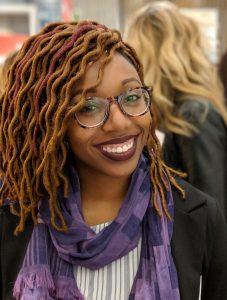 When Lexx Mills started college, she had big dreams of working in international development with a focus on the needs of women. GWST classes made sense, and they taught her much more than she was expecting. “Classes talked about so much going on in America, too–the intersections of race and other identities.” Although GWST classes cover national and transnational material, Mills found her attention shifting to her own communities and how to improve conditions for people living at the intersections of inequalities rooted in race and class.
When Lexx Mills started college, she had big dreams of working in international development with a focus on the needs of women. GWST classes made sense, and they taught her much more than she was expecting. “Classes talked about so much going on in America, too–the intersections of race and other identities.” Although GWST classes cover national and transnational material, Mills found her attention shifting to her own communities and how to improve conditions for people living at the intersections of inequalities rooted in race and class.
Mills graduated with her BA in GWST in 2013, and her career has taken her around the world and brought her back to Baltimore. She first completed a Fulbright teaching English in Malaysia. That experience drove her to seek out a teaching position, and she joined the DC Teaching Fellows program. She taught first grade in SE DC before moving back to Baltimore, where she taught fourth grade. “I enjoyed it, and it was the most challenging thing I’ve done in my life,” Mills says about teaching. “This was particularly true because I wanted to work in high needs communities. You have to be everything, and no matter how much you give, it’s never enough.”
Mills decided she wanted to move out of teaching and into more direct work with communities, so her career took her to the Port Covington Development team. Her work is to enforce the community benefits agreement to ensure that the South Baltimore communities (known as SB7) surrounding Port Covington see the benefits of economic growth in the area. She works on ensuring minority and women-owned businesses get contracts on the Port Covington development and receive business development resources to make sure neighbors have access to new jobs. Mills has also worked with area schools to advance educations partnerships. These have been, she says, “great community efforts. I’ve gotten to bring volunteers to the schools and see communities coming together.” Mills is currently working on a strategic planning process with the SB7 to determine the most essential issues to the community.
Next up for Mills is a trip to New Orleans for the Vanguard Conference, hosted by Next City. The nonprofit journalism organization pulls together leaders from around the country to talk about the most innovative things happening in cities around the world to move urban places forward. The experiential leadership conference received over 500 applications to attend; Mills was one of 40 young leaders chosen to go. She hopes to take what she learns from the conference and her ongoing work with her as she applies to business school. “I want to work on economic development in low income communities,” Mills says. “I want to help people start businesses in their own communities. Baltimore is developing, and I’m passionate about making this equitable development.”
When asked what she most took from her work in GWST, Mills said this: “Foundational for me was the idea that everything we know about the world is a social construction. Nothing has to be the way it is.” Additionally, she said, “GWST gave me language to talk about my experience as a Black woman that I didn’t have before. I didn’t have the language to talk about it outside of my personal experience. GWST looks not just at the individual level, but at the systemic level. That was extremely helpful for me as someone who wanted to do work in public service. That is what I got out of GWST. It taught me how to think differently, and how to challenge my own perspective, and others.”
We look forward to seeing how Mills continues to challenge and change the world.
Anne Sageng, ’12
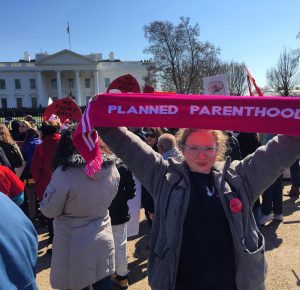 Anne Sageng graduated in Spring 2012 with a whopping three majors: American Studies, Cultural Anthropology, and Gender and Women’s Studies. While at UMBC, Anne was also active in WILL, coordinating clinic defense training for students. After graduation Anne continued working at Trader Joe’s and volunteering as a clinic escort and roving coordinator for the Washington Area Clinic Defense Task Force. “If you ever have a job here…” she remembers saying as she coordinated escorts at Planned Parenthood, and the rest is history.
Anne Sageng graduated in Spring 2012 with a whopping three majors: American Studies, Cultural Anthropology, and Gender and Women’s Studies. While at UMBC, Anne was also active in WILL, coordinating clinic defense training for students. After graduation Anne continued working at Trader Joe’s and volunteering as a clinic escort and roving coordinator for the Washington Area Clinic Defense Task Force. “If you ever have a job here…” she remembers saying as she coordinated escorts at Planned Parenthood, and the rest is history.
The election of Donald Trump in November 2016 has sent ripples through politics and culture, and a wave of volunteers washed up on the shores of Planned Parenthood. Anne was brought on as a part time volunteer coordinator, and the needs continued to skyrocket: volunteer applications quadrupled–they received over 100 applications in the 24 hours after election day–and her work was even more needed. She has since been brought on as a full-time employee, and she is grateful to get to use many of the things she learned in GWST every day.
Anne remembers her biggest lessons coming in GWST 200: Studies in Feminist Activism. She expected to be inspired by activism and to learn tools to do it better, but what she learned from her placement at a women’s center in the city was what not to do. “I learned the importance of asking people what they need, rather than assuming I knew what was best. That wasn’t happening at this site, and I saw the effects of that. My background in GWST 100, 200, and my work with WILL taught me this wasn’t right.” And that training continues to help her in her work at Planned Parenthood. “I bring that insight here–I try to meet people where they are. I do a lot more listening than talking.”
Anne hopes to continue at Planned Parenthood doing the work of reproductive justice for a long time. She is particularly interested in getting more involved with education. Does she miss UMBC? Sure, she says. “Whenever I go onto campus I get this feeling…I just love learning, I love this school. UMBC teaches people how to learn.” And she’s still doing it.
Max Wiggins, ’15
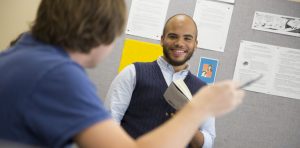 Max Wiggins landed at UMBC after transferring from Brown in Fall 2012 and enrolled in their first GWST courses. Max was hooked, completing a major and graduating in 2015. GWST caught up with Max to find out what they’ve been up to and how the GWST major continues to shape their work and life.
Max Wiggins landed at UMBC after transferring from Brown in Fall 2012 and enrolled in their first GWST courses. Max was hooked, completing a major and graduating in 2015. GWST caught up with Max to find out what they’ve been up to and how the GWST major continues to shape their work and life.
Max began college with a planned major in neuroscience. That was interesting and challenging, but Max found the level of abstraction made it a bit hard to feel grounded. GWST, on the other hand, gave them an immediate sense of how the individual is grounded in a world that is both shapes and is shaped by our choices and behavior. “That’s unique to my experience of GWST,” Max says, “that moment where you see yourself in these ideas and structures that are bigger than you.” Unlike other fields of study, Max found that GWST meant a “deep, serious engagement with texts that intersected with lived experience. That was transformative. I studied lots of things, but these moments of excitement about an idea, that there’s a way to change the world with ideas, that was different.”
Max is currently putting their major to work as an Upper School English Teacher at the Park School in Baltimore. They teach courses directly inspired by the curriculum at UMBC. Max says that GWST has shaped their life in many ways, but “most literally, it shapes what and how I teach at Park. My teaching is rooted in specific texts I read in GWST, but it is also rooted in the ethics of GWST as I see it–an ethics of deep skepticism: toward one’s own taken for granted beliefs.” In terms of teaching style, Max says they use techniques learned from GWST faculty: “I try to teach kids to reflexively challenge ideas about what seems natural. I push kids to ask, ‘What would it mean for a social thing to be natural? For whom is it helpful to say it is natural? How did it get to be seen that way?'” Max challenges students to be critical of the way the world is, how it got that way, and how it might be made differently in a more just way. In their words, “This stuff is super high stakes!”
Max is getting ready to start up a new year in the classroom after spending much of their summer pursuing a Graduate Certificate in Leadership in Independent Schools at Johns Hopkins. Max plans to pursue a second Graduate Certificate as well, in Urban Education. Asked if there’s anything they miss about GWST at UMBC, Max said this: “I wish I had more time to read and write. I got to write a lot and read a lot and tap into extremely personal and meaningful stuff at UMBC. I feel like it doesn’t get any better than that.” True that.
Garrett Wright, ’01
Garrett Wright completed a BA in Theater and a Certificate in Gender & Women’s Studies in 2001, before GWST was a department or offered a major. We caught up with him recently as he was leaving his position at Legal Aid Society of DC and heading to Portland, OR with his partner Jane Moisan and their son Judah in order to work with Legal Aid Services of Oregon.
After graduating from UMBC, Garrett participated in the AFL-CIO’s Union Summer program with SEIU Local 100 in Louisiana and Texas, an internship he credits Chair Carole McCann with helping him land. This organizing work inspired Garrett to follow that road, and he spent the two years working with the Student Peace Action Network in Silver Spring.
His next stop was law school, at UC Berkeley’s School of Law. He has since dedicated his legal career to working on behalf fair and affordable housing for tenants in New York City, Washington, DC, and now Portland. His new position will allow him to work closely with individual tenants and grassroots organizers to help low income people access and keep safe and affordable housing, a particularly challenging task in a rapidly gentrifying city in a state that currently has a prohibition on rent control ordinances.
Garrett has done some impressive stuff since graduating, but he still remembers and credits GWST as a place where he learned to think with a feminist lens. He enrolled in Dr. McCann’s Introduction to Women’s Studies course his freshman year. “I had been someone who had been fairly politically conscious in high school growing up outside DC,” he says. “While I’d had some experience during high school learning and participating in racial justice struggles, I didn’t know as much about feminist struggles. UMBC was the first structured learning environment I where I had the opportunity to learn more about feminist history, theory, and practice.”
Subsequent courses in community organizing and research methods helped Garrett think critically about the work he thought he wanted to do. “These classes made me look at critical ways to deconstruct the different professions I’d been interested in—especially the legal profession. It is one of the most conservative and reactionary professions, and is very resistant to change,” he says. “That makes it all the more important to learn about critical theory and how to use that to not take anything for granted in the work that I do.”
His Certificate in GWST prepared Garrett to do the work he does using explicitly feminist and antiracist lenses. He says that his work in affordable housing has shown him that while the crisis crosses many lines, it is often women of color who are the most vulnerable to rising rents and eviction. “Many members of community-based organizations that I have represented have been strong women of color at the forefront of leading the battles for housing justice on behalf of themselves and their neighbors,” Garrett says. “Eviction issues are not purely abstract class-level problems. Class matters a lot, and most of my clients are poor or working class— however, gentrification and housing discrimination disproportionately impact poor and working class women, People of Color, and immigrants. We need to challenge the racism at play in housing decisions—in zoning and land use issues; in the implicit and explicit biases of landlords, their attorneys, and judges; the historical effects of the redlining that prevented many People of Color from being able to obtain homeownership while government agencies and banks simultaneously engaged in greenlining of federally subsidized mortgages for white homeowners; and the predatory lending practices of today that are robbing wealth from communities of color. We also need to challenge the sexism that is really pervasive at the interpersonal level in many landlord-tenant relationships, which includes sexual harassment and homophobic conduct by many property owners and managers.
GWST is proud to count Garrett among our alums, and we hope he knows we are still here, teaching students to see through multiple lenses and to understand the structures of patriarchy and white supremacy that shape the lives of all of us.
Want to share your story or the story of a fellow UMBC GWST alum? Email Dr. Kate Drabinski with the details or to request more information.
